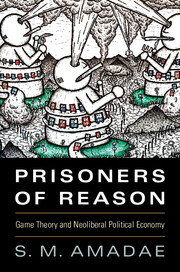6 - Social Contract
from PART II - GOVERNMENT
Published online by Cambridge University Press: 18 December 2015
Summary
In a strictly personalized sense, any person's ideal situation is one that allows him full freedom of action and inhibits the behavior of others so as to force adherence to his own desires. That is to say, each person seeks mastery over a world of slaves.
James M. Buchanan, 1974The reconciliation between morality and self-interest that mutual advantage theorists seek is hard to achieve, since the rules of justice creates a classic prisoners’ dilemma: even if you and I jointly benefit from the rules, I will do still better if you obey them and I allow myself to violate them when it suits me.
Daniel M. Hausman and Michael S. McPherson, 2006The financial crisis of 2008 provoked a lively debate among economists, investors, and consumers. For some, the collapse of the housing market stemmed from “progressive” attempts in the 1990s to make housing more affordable for the less well-off. For others, it was the result of “neoliberal” efforts to roll back regulation of the free market. Whatever the cause, the government's response was clear: a bailout for the banks nearly equivalent to the earnings of the top 1 percent of American income earners from the prior decade.
Roots of the crisis aside, how did we reach a point where such a bailout could become the consensus response? Property transfer laws, lax financial regulations, and neoliberal political philosophy all underlie the practices that led to this eventuality and its relative acceptance. According to the neoliberal Prisoner's Dilemma theory of the social contract, no income disparity is too great. So long as the least well-off are better off than in a state of nature, they have little ground for complaint. In this increasingly individualized and privatized economy, the worth of citizens depends solely on their command of resources and earnings potential. The financial crisis is indicative of late-modern neoliberal economics, which by applying the tool of noncooperative game theory and expected utility theory emphasizes the Prisoner's Dilemma model of the social contract and exchange and therefore inevitably condones profiteering through displacing costs on others. The neoliberal approach to economics also condones coercive bargaining by which negotiator's own profit margin is enhanced by threatening to minimize the best worst-case outcome for rivals.
- Type
- Chapter
- Information
- Prisoners of ReasonGame Theory and Neoliberal Political Economy, pp. 175 - 192Publisher: Cambridge University PressPrint publication year: 2016



